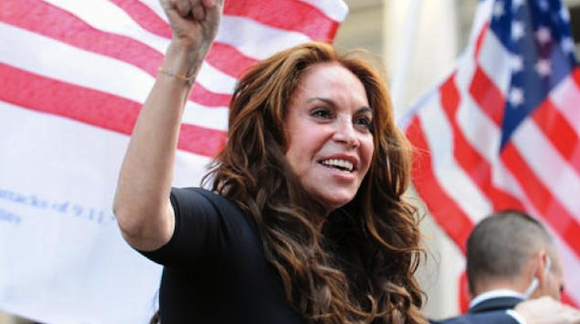
Pamela Geller. Image via Right Web
The ringleader behind the 2015 armed assault on the Garland, Texas exhibition of cartoons of the Prophet Mohammad that left two attackers dead was sentenced to 30 years in prison followed by a lifetime probation on Wednesday (February 8), reported the Arizona Republic. Abdul Malik Abdul Kareem provided the guns that Elton Simpson and Nadir Soofi used to open fire outside the exhibition. Kareem kept his head down as the judge read his sentence. “I had nothing to do with this crime,” he said.
The event, initiated by Pamela Geller, executive director of the American Freedom Defense Initiative (AFDI), [also known as Stop Islamization of America (SIOA)] said at the time, “I will not abridge my freedoms so as not to offend savages.”



1 comment
In response to “not offending savages” (bleh) and to the Garland event in general, I would like to quote Michelle Kraft’s “Suis-Je Charlie?” in response to the Charlie Hebdo attacks and subsequent CH cover.
“What this conversation points to is the tension inherent within the exercise of liberty. There is, after all, no such thing as absolute freedom. Optimal levels of liberty for all only come by agreement within the community to yield certain freedoms to one another. Normally, this is accomplished through mutual assent that we abide by laws. In matters where law is not the question, the decision is up to us as to how we might wield our freedoms in relationship with others within our community.
The cover of the survivor issue of CH was, at best, racist in its depiction of Muhammad rather than sympathetic. In the cartoon, the prophet is a stereotype, with a hooked nose overhanging his mouth and overly bulbous turban atop his head. It is only with the accompanying text on the CH cover that can one even remotely propose that the image might be favorable, but it’s not the text that’s in question. What is in question is the extent to which one group is willing to yield its freedom to another when those freedoms are in friction. When we are more concerned with asserting our rights than we are with mutual respect, we risk marginalizing those with whom we share community. Did not Charlie Hebdo practice such disregard regularly? Were not the murderers of the magazine’s staff themselves extreme versions of this same kind of contempt?
I do not mean to suggest that the staff of CH were, in any way, responsible for the violent attack that took place on January 7. Images—even when offensive or heretical—are, after all, merely pictures. Human life is sacred. Noam Chomsky said, “If you believe in freedom of speech, you believe in freedom of speech for views you don’t like. Stalin and Hitler, for example, were dictators in favor of freedom of speech for views they liked only. If you’re in favor of freedom of speech, that means you’re in favor of freedom of speech precisely for views you despise.”
I am advocating that in our exercise of freedom of expression, we respect one another and practice tolerance. Images are powerful in their ability to open dialogue and debate, as well as in their capacity to offend. There is a famous quote oft attributed to the French writer and philosopher Voltaire (but actually written by his biographer Evelyn Beatrice Hall): “I disapprove of what you say, but I will defend to the death your right to say it.” In this spirit, I hope, I am Charlie.”